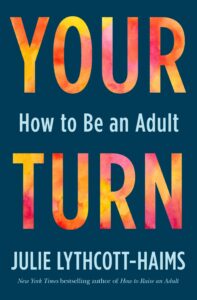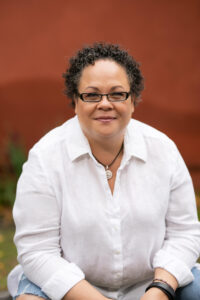Your Turn: How to Be an Adult by Julie Lythcott-Haims (Book Excerpt)
 I’ll risk your eye-roll because this needs to sink in: Life is not about getting to some perfect destination that gives everyone else FOMO. When your death comes, and you’re sized up by your family, friends, God, and the universe, or whatever you believe in and wish happens at the end, the small moments of you just being you will form your final video. Whether you’re a good person or a bad person in the tiny little moments along the way is E.V.E.R.Y.T.H.I.N.G. What we’re talking about here is your character.
I’ll risk your eye-roll because this needs to sink in: Life is not about getting to some perfect destination that gives everyone else FOMO. When your death comes, and you’re sized up by your family, friends, God, and the universe, or whatever you believe in and wish happens at the end, the small moments of you just being you will form your final video. Whether you’re a good person or a bad person in the tiny little moments along the way is E.V.E.R.Y.T.H.I.N.G. What we’re talking about here is your character.
That should feel like a relief. Because you actually have control over your character. But what is it? It’s the outward manifestation of your personality and behavioral traits, which others can observe and experience from interacting with you. You wouldn’t need to worry much about your character if you lived on an island alone. But we are a social species, so your character matters because it matters to others. Character can make or break you. You want to make your character good.
THOU SHALT BE A GOOD PERSON—HOW TO GROW YOUR CHARACTER
Our son, Sawyer, was born in the early summer of 1999 and our daughter, Avery, was born in 2001 almost exactly two years later. With our new parenting hats on Dan and I told people that to us, parenting was about taking sandpaper and sanding off whatever rough edges our kids were born with (whether thanks to DNA or personality), so that they would be able to go out into the world and interact kindly and effectively with other humans. Like any parents, we expected and hoped that our children would be good people.
These twenty-two years later it’s interesting to me that our philosophy was about changing our kids (by sanding off the rough edges) as opposed to giving them their first little tool kit equipped with the tools they would need in order to make it in the world. In hindsight, the tool kit is probably a kinder metaphor than sandpaper! Regardless, our intentions were spot on. Character matters big time. And the cool thing about good character is that it benefits those with whom you interact and it means the doors of life are more likely to open wide for you. Good character is a win/win. It benefits everybody. And although you may feel you’re beyond needing to learn this stuff since you’re already grown, I’ve found I personally need a refresher from time to time as an adult so I’m thinking you may benefit from one, too.
WISDOM FROM THE ELDERS
For thoughts on cultivating a good character, I want to set the stage with a bit of folklore my mother likes to recite. Mom is an eighty-two-year-old white British lady from a region in the north of England called York- shire, near the border with Scotland. That’s where folks including my great-grandfather mined the earth and spoke (and still speak) a dialect that the more wealthy and educated Brits almost literally can’t under- stand and make fun of. So, while she tells this story in her “Broad York- shire” dialect, I’ve put it into American English for you.
The setting is an old man sitting in a chair on the outskirts of his village whose job is to monitor who is coming and going and interrogate any strangers who approach.
The old man sat on a roadside seat, solemn and deep in thought. Thinking on the ways of man with man, and changes time had wrought. When up comes a stranger chap, a man who’d come to town.
An outsider, it was plain to see, taking his first look around. “What sort of folks live here?” asked he. And the old man replied, “What sort of folks are you from?” Said the stranger with a sigh, “Suspicious, narrow, mean as muck, and most unfair, I fear.”
“Then friend you’ll find . . .” was his reply, “same type of folks live here.”
The stranger left. The old man sat that day and then some more. When up there came another man, just like the time before.
“What sort of folks live here?” asked he. And the old man says again: “What sort of folks are you from?” And the stranger then began, “Glad you asked, I miss them so, it’s been so far I’ve come
“Finest in world, a champion lot, good neighbors every one.”
Beamed the old man’s face like the risen sun, and stole to his eye a tear. “Then friend you’ll find . . .” was his reply, “same type of folks live here.”
As I type this wisdom from my elders, tears spring to my eyes. I can hear their dialect and I can travel back in time to sit in the lap of my Grandma Snookes—my mom’s mom, who is long gone—who treated me, her only Black grandchild, with unconditional love. And in addition to the personal memories it evokes, this story just gets me because it’s so damn on point. Aside from the prejudice of others—which is a very real thing, I wrote a whole book about my experiences with it—our expe- riences in life are largely influenced by our behavior and outlook. Our character determines our perception, and how the world will respond to us. We receive what we give. It is so fucking simple.
And here’s another piece of inspiration from someone else whose voice resounds in my head, yet who died just six months after I was born: Dr. Martin Luther King Jr. Two months before he would be assas- sinated, King was preaching at the Ebenezer Baptist Church in Atlanta, where he told a story about character based on a New Testament story about Jesus and two of his disciples. The disciples were ambitious and wanted to be, as King puts it, “great.” But Jesus taught them that while ambition is a good thing and striving for excellence is a fine goal, what we should be ambitious about is having a strong character. King makes two points about Jesus’ teachings. First, he notices (as we noticed, too, in chapter 3!), that greatness isn’t just about being someone’s favorite; it’s about skills. It’s not about someone saying you’re perfect; it’s about you doing things well. But then King points out that Jesus is making another point here, which is that greatness is actually about goodness, it’s not about being the top dog. “[T]he greatest among you shall be your servant” is how King quotes Jesus. King’s definition of greatness is about someone who wants to be of good use.
And so Jesus gave us a new norm of greatness. If you want to be important—wonderful. If you want to be recognized—wonderful. If you want to be great—wonderful. But recognize that he who is greatest among you shall be your servant. That’s a new definition of greatness.
And this morning, the thing that I like about it: by giving that definition of greatness, it means that everybody can be great, because everybody can serve. You don’t have to have a college degree to serve. You don’t have to make your subject and your verb agree to serve. You don’t have to know about Plato and Aristotle to serve. You don’t have to know Einstein’s theory of relativity to serve. You don’t have to know the second theory of thermodynamics in physics to serve. You only need a heart full of grace, a soul generated by love. And you can be that servant.
The third description of character I want to share with you is from professor Emma Seppälä, who is the science director at Stanford’s Center for Compassion and Altruism Research and Education. Professor Seppälä and I are in an authors’ group, and she recently opined in an email to all of us that in needing to achieve some external definition of success her students were missing the larger point of life:
I asked my undergraduates a question the other day: What are the characteristics of the most wonderful people you know? The WONDERFUL ones?
They said, Loving. Caring. Kind.
And so I asked them, Is that not what success actually is? To be a wonderful person who touches someone else’s life?
From Dr. Seppälä, to Dr. Martin Luther King Jr., to Dr. Jean Lythcott (my mother!), these are beautiful reminders of what good character looks like. Looking back over the years of my life, it was hardest for me to exhibit good character when I was struggling, angry, or sad. Once, when I was in fifth grade, a classmate named Suzie was going to get a special surgery for problems she was having with her knees and she got all kinds of attention for that. I was jealous. And one day when everyone was at recess I went into Suzie’s desk and broke her ruler. When she saw it and told the teacher, and the teacher asked our class who had done it, I didn’t say a word. In fact I’ve never told anyone about it until right now as I share it with you on this page. Why does something from so long ago stay with me? Because my soul still knows it was wrong and I haven’t asked for forgiveness. My soul is keeping track of my character. Even though it’s been forty-three years, I think I’d better reach out to Suzie.

Julie Lythcott-Haims is the New York Times bestselling author of How to Raise an Adult and Real American. She holds a BA from Stanford, a JD from Harvard Law School, and an MFA from California College of the Arts. She resides in the Bay Area with her partner, their two itinerant young adults, and her mother. For information, visit Your Turn.
Tags: how to be an adult, your turn















